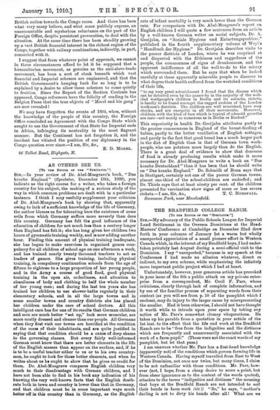AS OTHERS SEE IIS.
(To TUB EDITOIL or via " SPZETAT08.41 SIR,—In your review of Dr. Abel-Musgrave's book, " Das kranke England" (Spectator, December 18th, 1909), you indicate as the right course for a writer, who takes a foreign country for his subject, the making of a serious study of the way in which common problems are dealt with in a particular instance. I think I may usefully supplement your criticism of Dr. Abel-Mtisgrave's book by showing that, apparently owing to lack of a sufficient knowledge of the life of Germany, the author blames us for tolerating here the existence of some evils from which Germany suffers more severely than does this country. Germany has felt the good influence of the education of children for not much less than a century longer than England has felt it; she has long given her children two hours of gymnastic training weekly, and is now adding another hour. Finding this amount of physical training inadequate, she has begun to make exercises in organised games com- pulsory for all children of school age on one afternoon a week, and has trained nearly twenty thousand teachers to act as leaders of games. She gives training, including physical training, in compulsory continuation schools from the age of fifteen to eighteen to a large proportion of her young people, and in the Army a course of good food, good physical training in the open air, orderliness, and attention to cleanliness of body and clothing to half the whole number of her young men; and daring the last ten years she has trained her children to use shower-baths regularly in their elementary schools, and in all the large towns and in some smaller towns and country districts she has placed her children under the care of school doctors. All this intelligent care has for one of its results that German children and men are much better "set up," look more muscular, are more neatly dressed and cleaner than our people. All Germans when they first visit our towns are horrified at the condition of the mass of their inhabitants, and are quite justified in saying that that condition should be a cause of deep shame to the governing classes. But every fairly well-informed German must know that there are better elements in the life of the English masses than appear on the surface, and, if he is to be a useful teacher either to us or to his own country- men, he ought to look for those better elements, and when he writes about us he ought to show that he gives us credit for them. Dr. Abel-Musgrave compares English children very much to their disadvantage with German children, and I have not been able to find in his book any indication of his knowing the very well-known facts that the English death- rate both in town and country is lower than that in. Germany, and that children must be in some important ways much better off in this country than in Germany, as the English
rate of infant mortality is very much lower than the German rate. For comparison with Dr. Abel-Musgrave's report on English children I will quote a few sentences from an article by a well-known German writer on social subjects, Dr. A. Grotjahn, on " Soziale Hygiene and Entartungsproblem," published in the fourth supplementary volume of Weyl's " Handbuch der Hygiene." Dr. Grotjahn describes visits to the poorer districts of London, where he was surprised at and disgusted with the filthiness and raggedness of the people, the commonness of signs of drunkenness, and the apparent indifference of all the well-to-do to the misery which surrounded them. But he says that when be looked carefully at these apparently miserable people to discover to what degree their health suffered from the wretched conditions of their life,
"to my very great astonishment I found that the disease which can be detected even by the passer-by in the majority of the well- clad workpeople's children in Berlin and its suburbs, rickets, is hardly to be found amongst the ragged urchins of the London workmen's districts. The children are well nourished, have rosy cheeks, and are energetic in all their movements. Moreover, children with the kind of face which is typical of adenoid growths are rare—not nearly so numerous as in Berlin or Bladed:
This superiority in health Dr. Grotjahn attributes partly to the greater commonness in England of the breast-feeding of babies, partly to the better ventilation of English cottages, and partly to the fact that good bread has a much larger part in the diet of English than in that of German town work- people, who use potatoes more largely than do the English. There is a great deal of evidence to show that dearness of food is already producing results which make it more necessary for Dr. Abel-Musgrave to write a book on "Das kranke Deutschland " than it has been that he should write on "Das kranke England." Dr. Schmidt of Bonn says that in Stuttgart, certainly not one of the poorer German towns, almost one-third of the school-children are underfed; and Dr. Thiele says that at least ninety per cent. of the children presented for vaccination show signs of more or less severe rickets.—I am, Sir, &c., T. C. HOIISFALL, Swanscoe Park, near Macclesfield.






































 Previous page
Previous page